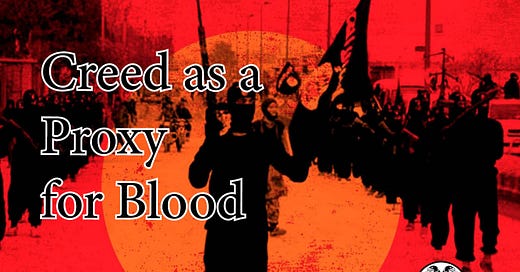If you prefer audio of this article, click here.
In 2006, at the height of radical Islam, the RAND Corporation published an article entitled Today’s Wars Are Less About Ideas Than Extreme Tribalism.1 If they had simply removed the word “today’s”, this would have been far more truthful, but then, liberalism can’t admit that ideas aren’t in the driver’s seat. No propositional identity can—saying the quiet part out loud robs it of its power.
All throughout history, men have died for ideas. But in the final analysis, those ideas that men have died for have only ever been proxies for blood, and when they cease to be that is when men cease to find them worth dying over. Universalism has triumphed over tribalism, but it’s a Pyrrhic victory—tribalism has always had the last laugh.
In several articles we’ve discussed Universal Darwinism, the fact that ideas are subject to natural selection like anything else, that they “live their own lives” and have their own interests. Ideas need hosts, agents who hold them, and the interests of the ideas are not necessarily aligned with the interests of the host. Some ideas propagate at the expense of the host; we’ve called this viral propagation. Some ideas propagate only when the host does; we’ve called this organic propagation. These ideas that serve organic purposes promote group distinction and solidarity. Even a universalistic creed can do that—for a time. Ibn Khaldun was aware of this, which is what he had in mind when he said “group feeling results only from blood relationship or something corresponding to it.”2
Christianity once provided such a group feeling, a sense of distinction from the outsider. This may come as a surprise to folkish pagans, who see Christianity through the lens of universalism and propositionality, and as antithetical to ethnic distinction. In practice, Christianity has absolutely been a proxy for ethnicity, and it continues to be to this day in a much-attenuated form.
The Christians who most strongly identify as Christian in the West today are Catholics. This is not due to Catholicism’s doctrine, but is rather the result of its steady loss of ground for centuries: Catholicism is a minority religion in the West, and that means it’s a good ethnic marker. Ethnic Celts, for example, tend to identify quite strongly as Catholic. Whether in French Canada, Ireland, or to a lesser (but still noticeable) extent, Australia, being Catholic is part and parcel of national identity. The creed does not really matter to the ferocity of belief—the creed could be, and historically was, radically different, with the same result.3 If you look to Eastern Europe, you will find the same effect, for the same reason, in Orthodoxy—but yet stronger because of being even more of a global minority. The reasons offered for the belief vary; the ultimate reason is that being Catholic or Orthodox today is a proxy for ethnicity.
Even more surprising, liberalism has an ethnic dimension. It’s well understood that political beliefs are heritable,4 and this is no different in the aggregate than it is within families. If you spend any time around upper-class liberals, it becomes clear that their antipathy toward conservatism is as much a matter of belief as it is a gut-level revulsion toward “those people, over there”. As is well-known, most wealthy liberals spend very little time around people of colour, and their beliefs keep them away from country bumpkins, who are ethnically distinct from them generally,5 so liberalism ends up being a moderately effective ethnic barrier. If musical taste can be a proxy for ethnicity,6 then surely political beliefs are, including liberalism.
There is a long history of tribal proxy wars through ideology. We could point to the Sunni vs. Shia disputes, which map on to Arab vs. Iranic; think of the Christian Serbs vs. Muslim Kosovars, a straightforwardly tribal dispute with only a thin veneer of religious disagreement; think of Mahayana vs. Theravada Buddhism, which maps on to Northeastern vs. Southeastern Asians; think of Vaishnavism vs. Shaivism, which breaks down along Aryan vs. Dravidian lines. The list is virtually endless. It would be absurd to think that in all these theological disputes the beliefs have given rise to the ethnogenesis rather than that the theology7 is an expression of and marker for ethnicity.
This would seem to fly in the face of our thesis about universalism propagating virally, that is, either indifferently to or even at the expense of the host. If universalist theologies can promote asabiyyah, doesn’t this mean they’re organic, i.e. they serve the interests of the believer? As an ethnic marker, they can indeed serve the host’s interests, but this can never last, and the degree to which the universalism succeeds in its universality is the degree to which it becomes a poor ethnic marker, and thus indifferent or even hostile to the host. There is a cycle to all this:




